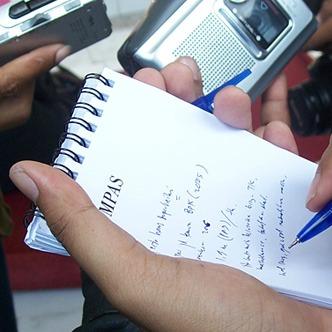BOB GARFIELD: While there is little mystery to the events swirling outside of Syria, what goes on within the civil war-torn country is another matter altogether. Apart from Assad regime propaganda and the partisan statements of the rebels and their sympathizers, the outside world must depend on journalists operating within, a group increasingly populated by freelance reporters, photographers and camera crews, all operating at great personal risk.
The Committee to Protect Journalists reports that nearly half of the journalists killed in Syria since the conflict began were freelancers. Because of those risks and because of the liability they represent, several UK-based newspapers had said they would no longer use freelance journalists in war zones. Among them, The Sunday Times, The Guardian, The Independent and The Observer. But as the crisis in Syria escalates, those papers are once again soliciting freelance help. And, according to documentarian and teacher Richard Pendry, they are doing so while attempting to reduce their own risks, if not those of the freelancers they employ. Writing in the Columbia Journalism Review, Pendry said, It’s all about the money.”
RICHARD PENDRY: Foreign news budgets began to shrink during the course of the nineties and afterwards, so now we have a situation where there is less money for both freelancers and staff people to report from war zones. The very cheapest people to do your reporting are locals, but the second most cheapest people to do your war reporting for you are international freelancers. They call it the tribe, so if you’re part of the tribe you go from war to war and from conflict to conflict selling your stories to the news organizations.
BOB GARFIELD: While it's nominally less expensive to buy stories and photographs from members of the tribe, it's also very dangerous to report from war zones and, therefore, there is liability attached to the use of freelancers for whatever news organization is buying the stuff. If someone is killed, injured, had their property stolen, kidnapped, held for ransom, all of a sudden it gets very murky.
RICHARD PENDRY: It is unbelievably difficult, time consuming and expensive to get people out of trouble in war zones. So, on the one hand, you have to cover the war; there’s no doubt about it. On the other hand, it's very likely that you’ll become responsible for that person legally. There is lots of evidence that news organizations are desperate to minimize their responsibilities for the people that gather news. Anybody that’s being asked to file their story or submit their footage after they leave Syria,that will be evidence.
BOB GARFIELD: So you’re saying that the The Times of London or The Sunday Times or The Guardian, or you name it, says, yeah, we will buy your story or your photo, but you have to be back someplace safe before we’ll buy it from you, which means that you, the freelancer, have borne all of the risk by reporting on the stories. Is that happening a lot?
RICHARD PENDRY: It’s happening a lot, yeah. Now, I’ve multiple examples of freelancers who told me that’s the way it’s done. By the way, the freelancers very often bore not just the risk but the costs. So at the moment, it’s expensive being a freelancer in, in Syria.
BOB GARFIELD: You alluded earlier to the cheapest way of, of getting news out of Syria, and that is to rely on locals. The wire services, you say, have been doing that. But you believe that that's relying on a source that is inherently unreliable.
RICHARD PENDRY: There are some international freelancers that work for the wires, fewer and fewer, as the risk of kidnapping gets worse and worse in Syria. But overwhelmingly, it’s Syrian nationals working for the wire agencies that are supplying a huge amount of material for our newspapers, broadcasters, websites, all the rest of it. And one has to ask whether it’s actually reasonable to expect Syrians who are not trained journalists to be able to report on their own civil war. It’s a huge ask.
BOB GARFIELD: Is, is there a solution for this problem, any more than there’s a solution for the Syria crisis, in general?
RICHARD PENDRY: Voters in the UK and in the US are being asked to perhaps go to war on the basis of some YouTube videos, some intelligence that comes from our governments. And the truth is that Syria is a very difficult conflict for everybody. And it’s proving a very difficult one for the news industry to deal with. BOB GARFIELD: Richard, thank you very much.
RICHARD PENDRY: Thanks very much, thank you.
BOB GARFIELD: Richard Pendry is himself a freelancer, a documentarian and a lecturer at the University of Kent.
